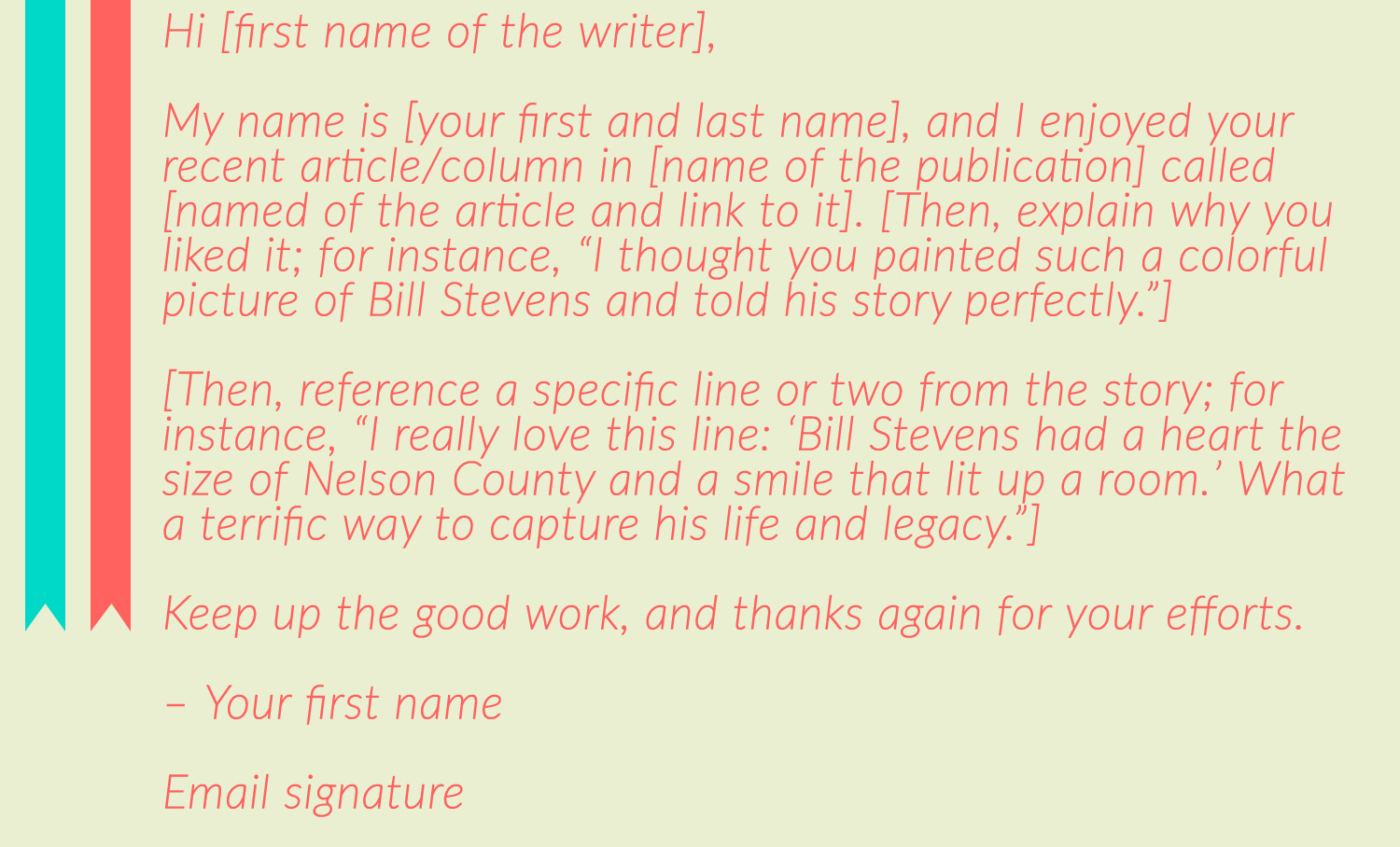Want to get free press? There’s a right and wrong way to do it.
A young blogger recently penned a well-meaning editorial on how to better connect with journalists when reaching out to them in an effort to earn your way into their hearts so they’ll write about you. He urges people to go find a journalist and compliment them without mentioning their brand. So far, not bad advice.
Here’s the formula he suggests:
He then recommends you CC their boss to flag them as to how great the journalist is, insists that you keep it all about the journalist and 0% about you, and let your email signature speak for itself. He concludes, “Journalists are people too. Give praise, make a friend and develop a relationship over time. The coverage you seek is closer than you think.”
Maybe “bad” is harsh. The advice sounds good but is misguided.
What’s right about this advice
First, let me explain that I operate a sizable news room. When it comes to pitches, I am the front line, and not a single story is published without my involvement. I’m the point of contact for hundreds of PR firms and thousands of companies. In my capacity, I receive hundreds of emails a day from brands hoping we’ll give them the time of day. Hundreds. I’m not exaggerating.
So, where the advice is not misguided is in the fact that journalists are people, and enjoying praise is inherently human nature. Reaching out to a journalist to develop a rapport is never a bad idea unless done poorly.
Here’s what’s wrong about this advice
Treating journalists well is the only advice given above that will get you ahead. If that email shows up in my inbox, I can’t guarantee a favorable response outside of a simple “thanks” as I trash it, not because I’m rude (I’m not), but because it’s just one more thing you’re putting on a journalist’s plate (“read this template compliment that is a misguided attempt to touch your heart, then craft a meaningful response, look into my company because you’re so impressed, then write about me so I can be the next Zuckerberg”).
Further, I get a similar template emailed to me all the time. Anything that says “I’m a big fan of yours” and cites an article I’ve written feels forced and is a red flag to me, because if you were such a big fan, we would have had more organic interactions by this point (like you commenting on the article or tweeting me without selling me or my staff). If you reference one specific article, that usually means you had no idea who I was five minutes ago, but you’ve spent just enough seconds to find a link and paste it as proof that you’re a fan.
The template email is kind and generous, and a new journalist would get a kick out of it, but reaching a busy news room when everything is absolutely on fire (and inadvertently demanding attention for what is clearly an attempt to gain favor and attention, not a compliment without strings), will land you in the trash just as fast as blindly sending a press release. It’s too obvious, it will generate eye rolls, we get these emails all the time, and it’s often some SEO person in India that wants to be hired, or a startup that is trying (poorly) to do their own PR. What you don’t realize is that this email template is actually pushy, and you didn’t even mean to be pushy!
Here’s the real advice, the real insight from a news room
First and foremost, connect with the appropriate person. Find stories about your competitors or stories similar to what you’re pitching to know who’s covering that beat. The fastest way to land in a trash bin is by going to the wrong inbox. Find individual writers who specialized in your area – don’t just email the Editor-in-Chief.
Now that you’re with the right journalist, if you really want attention, there are three ways to do it:
- Hire a legitimate PR firm. Chances are, they have well groomed connections at all of the news outlets your template email might otherwise annoy. They will put together a legitimate strategy and execute it more quickly and effectively than someone who just wants to sell their widget ever could.
- No budget? Just get to the point. Send your press release, but at the top, don’t act like you’re a journalist’s friggin’ best friend from college, or biggest fan (they already know who their biggest fans are, trust me), just remember that your email gets five seconds before a decision is made as to what happens with the email (read, respond, or trash). In two bullet points, say what’s in the attached press release and save the journalist time. There’s no slimy feeling, it’s just business, and if it’s a fit, I don’t care if we’re friends or not, we’ll write about your widget.
- Organically connect with journalists over time. Through social networks, networking events in person, or over email, just as you would establish a relationship with anyone, it starts with a simple like, a retweet, jumping into a natural conversation, then another conversation, and another. Nothing is forced here, and if they ignore you, move on. Getting to know a journalist’s needs without selling them, and getting to know them personally (where they prefer to connect), is time consuming, but worthwhile if trying to do your own PR.
The truth is that no one wants to be sold. Be sincere, get to the point, and always save someone time – news rooms are super hectic, and injecting yourself had better be mutually beneficial. If you can offer a journalist what they need right off the bat without kissing ass, you’re already miles ahead of the competition.
Lani is the COO and News Director at The American Genius, has co-authored a book, co-founded BASHH, Austin Digital Jobs, Remote Digital Jobs, and is a seasoned business writer and editorialist with a penchant for the irreverent.








































Danny
February 6, 2015 at 11:51 pm
Hi Lani,
I must say I’m impressed at how thoroughly you went through my blog post and weighed its pros and cons. I appreciate your opinion because you made me think through my argument in different ways. So thank you.
I suppose I should have made clear a one-time “compliment” email to a journalist will not create a lasting relationship. Yes, it takes other modes of communication like comments in articles and even an in-person meeting. And I like the additional outreach you suggested (like to hire a real PR firm).
I do believe an email like the template I propose is ONE way to kickstart a relationship. I have a hard time believing every reporter out there is inundated on a daily basis with kind notes about his/her work. Most readers don’t take the time. And most journalists don’t hear from the public unless it’s to complain or leave a nasty comment.
I would hope even the most hardened reporter can distinguish a genuine message from one that’s inauthentic. And I would never tell my readers to be phony to get ahead.
That being said, I think I will amend my piece to clarify my argument. And for that, I thank you.
Pingback: Best Seo Blogger Templates
Chris Johnson
August 14, 2019 at 6:58 pm
One thing you missed.
The “poop joke” method. IF you can find a great poop joke, and lead with that, your pitch will seem like a breath of fresh air.
Lani Rosales
August 14, 2019 at 8:27 pm
I mean YEAH, duh. 😉